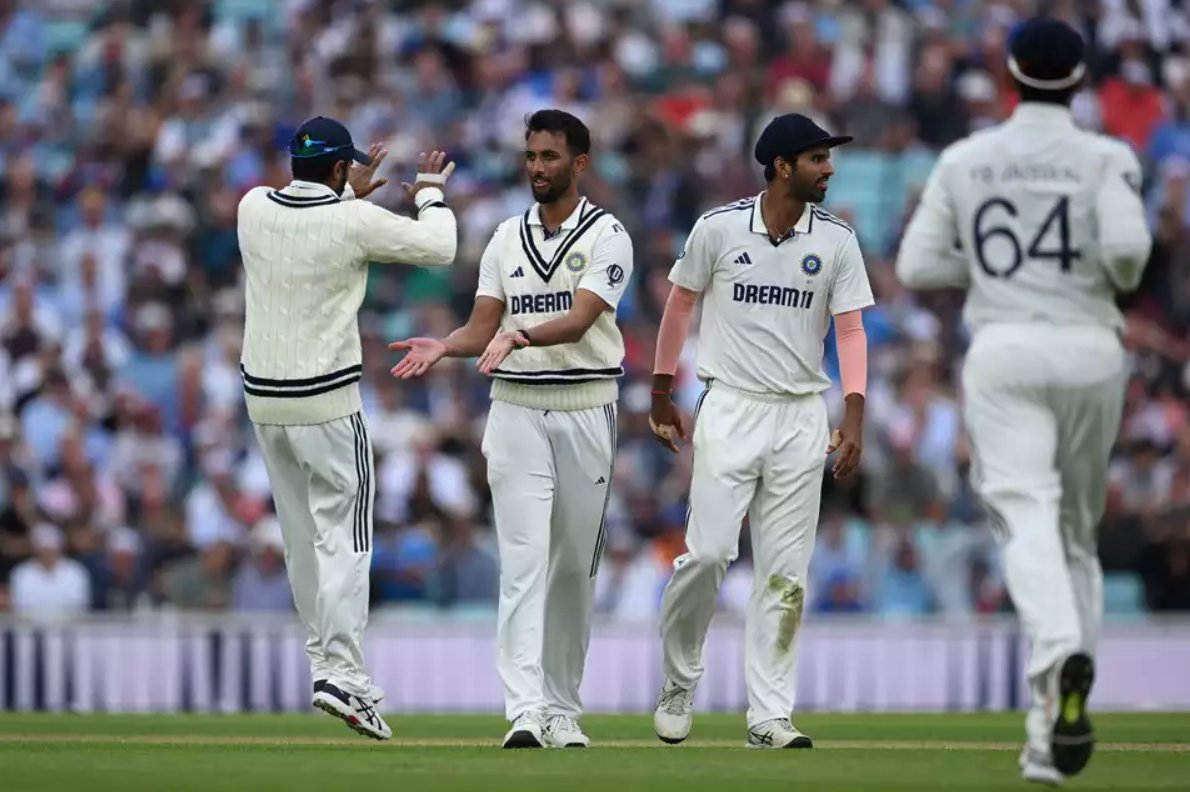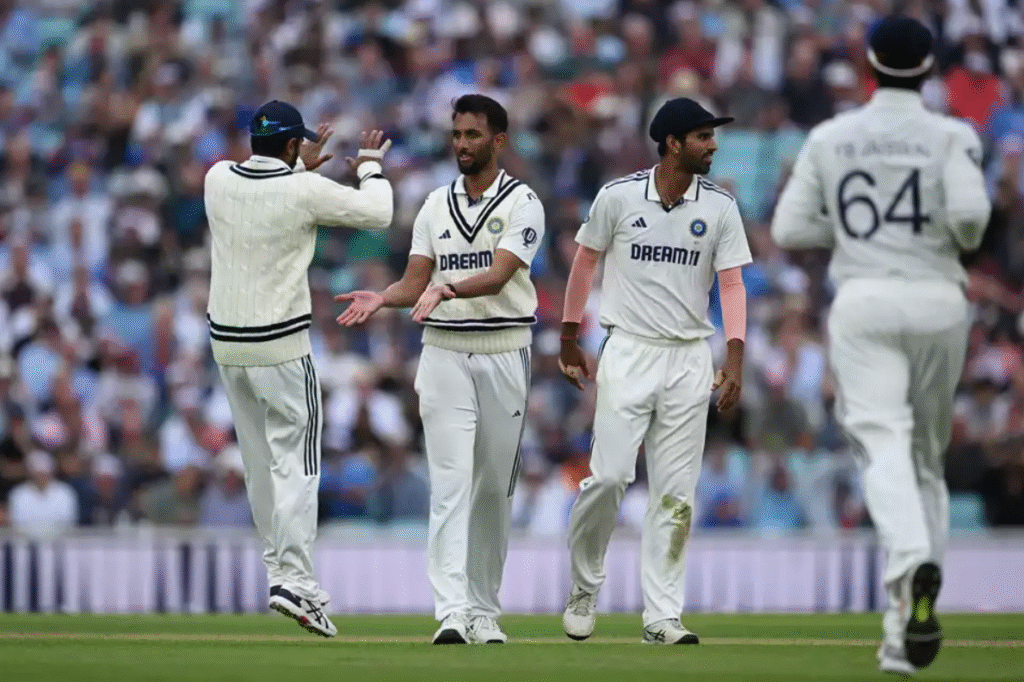
Today was the day they’d warned about.
India took the light roller in the morning, hoping to preserve a bit of juice in the pitch for their bowlers, and lost their four remaining wickets in 28 minutes, across just 34 deliveries. Then England wheeled out the heavy roller, not to tame the menace, but to smooth the stage for their own. How would India’s 224 stack up against a philosophy?

On the 22nd day of the series, Bazball arrived in all its unruly glory. The word – so often accompanied by an exclamation or a sigh, depending on the side of the fence – felt less like a slogan, more like reflex. And if ever there was a day for it, this was it: the pitch alive, the opposition’s total middling, the risk-reward equation tilted just enough. This was a chance for another thumb to the eye of tradition, but one that made perfect cricketing sense. On a surface like the one at The Oval, it wasn’t about surviving the test. It was about landing your shots first.
Funnily enough, it was India who landed the first jab. After a tidy first over, Akash Deep sent a sharp nip-backer into Ben Duckett’s groin. His next ball seamed away and India burned a review chasing an LBW that wasn’t there. Then came the mood swing: Duckett charged and missed, fended another off the splice that lobbed just between two fielders, and finally, with audacity still unbeaten, reverse-scooped the last ball for six.
India might still have claimed moral victory in the moment, if they hadn’t lost their lengths and gone 10 overs without a boundary-free set or a wicket. In that time, Duckett and Zak Crawley plundered 92 runs. The spell’s most audacious moment came when Siraj offered a full ball outside off, an invitation to drive. Instead, Duckett walked across his stumps, got inside the line, and scooped it over the ‘keeper’s head for six.
It was the final ball of the seventh over. Siraj wandered to mid-on, dazed. KL Rahul, the designated ball-shiner, had to call out three times before he could toss him the ball, which Siraj passed along absent-mindedly. Ravindra Jadeja then strolled over, gesturing for calm. Shubman Gill took him off after four.
It was hard to say if Siraj had bowled well or poorly. The truth lay somewhere in between. But in Test cricket, bowlers of the quality of Siraj don’t usually go at seven an over in a “somewhere-in-between” spell. That’s Bazball for you: turning half-spells into full-blown spells of pressure.
Yet this wasn’t the spray-and-pray of Manchester. India’s seamers bowled good lines; Duckett and Zak Crawley took risks to hit them off their lengths. But there was a subtler trick to it, too: what counted as a ‘good’ ball shifted between Duckett and Crawley. Their height difference distorted lengths. What Crawley punched on the rise, Duckett pulled or cut. They disrupt by design, and on a tricky wicket with a low total, disruption hits harder.
So where could Gill turn? He had picked the extra batter – Karun Nair, who had done his bit with a crisp, necessary 57 – but that left him with just three seamers on a seam-friendly wicket. And none of them answered to the name Jasprit Bumrah.
There would be no shortcuts. No relief. They had to troubleshoot on the fly. This was school, a classroom in the open. And the learning had to be fast. One more bad session and the series they’d dominated would be lost in a whimper. Prasidh Krishna revealed later that the three quicks had huddled at lunch. They spoke of plans, yes, but also of presence, how to lift each other, how to carry better body language.
And Akash had given them a spark. Just before the break, he’d switched angles and came over the wicket to Duckett. Dot. Dot. Then a release-seeking reverse scoop, edged to the keeper. India had a crack. Gill kept him going from the Pavilion End after lunch, and Akash responded with five tight overs (0 for 16). After resting for merely three overs, he returned from the Vauxhall End for six more (0 for 18). The squeeze paid off. Prasidh struck from the other end when Crawley miscued a pull and fell for 64.
In the hour post-lunch, India bowled nearly half a metre fuller on average. More balls in the channel (59.8% to 65.1%). More hitting the stumps (5.1% to 16.2%). The shift wasn’t seismic, but it was enough to bend the day.
England trailed by just 95. But India had nudged a door open, and through it stormed Siraj. After just four overs in the morning, he returned with an eight-over burst (8-0-35-3) that was all heart and hostility. After five overs, Gill would glance his way at every change of ends, and Siraj would already be in the process of removing his jumper and heading towards the umpire.
This was his fifth straight Test of the series. The only quick still standing after featuring in all five Tests of this unforgiving series. It was his 38th and longest spell. Yet there was no fade, no slack in his seams. He had spoken in Manchester about drawing inspiration from Ben Stokes’ long spells. Now he was writing his own.
Longer spells can take a lot out of you, but they can also help you get into serious rhythm if the ball is coming out right. He hit that in-between length, just full enough to draw doubt, just short enough to prevent a stride. He found outswing. He got the wobble to nip back. Ollie Pope was cut in half. Joe Root was set up with two away swingers, then pinned by the one that seamed back. Jacob Bethell got the only full ball, a surprise yorker that dipped and tailed into his boot.
At the other end, Prasidh held his ground. Dropped in Manchester for a bowler who flew in and jumped the queue, he now had a point to prove. Jamie Smith, the same batter he’d dished out short balls to in Leeds and Birmingham on the captain’s advice, nicked off trying to play the channel. Jamie Overton missed a wobble ball and was trapped in front. Gus Atkinson slogged and paid the price. And when Siraj bowled Harry Brook to claim his 18th wicket of the series, going past Stokes, England’s lead was just 23.
Today was the day they’d warned about. The day when India’s challenge could have melted, and the series quietly settled. But just when it threatened to run away from them, it was the fast bowlers who reached out and held the day by its collar.




